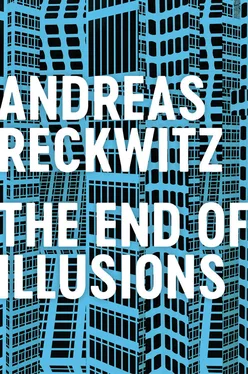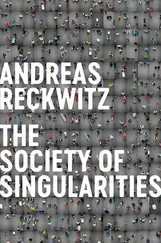* * *
In the first chapter – “Cultural Conflicts as a Struggle over Culture: Hyperculture and Cultural Essentialism” – I discuss the ways in which late-modern societies are defined by conflicts over culture and identity. Contrary to Samuel Huntington’s prominent thesis that we are dealing with a struggle between cultural spheres, I show that, across the globe, there are now two fundamentally oppositional ways of dealing with culture. One approach – that of hyperculture – allows for individual self-development and provides space for diversity on global markets, while the other approach – that of cultural essentialism – understands culture as a fixed entity or as the medium of a given community’s collective identity. Here I examine the relationship between these two forms of “culturalization” and ask whether there might be an alternative to both of them.
The second chapter – “From the Leveled Middle-Class Society to the Three-Class Society: The New Middle Class, the Old Middle Class, and the Precarious Class” – investigates the new differentiation that presently characterizes the social structure in Western nations. Over the course of post-industrialization and the expansion of education, the formerly all-encompassing middle class of industrial modernity gave way to a new, tripartite class structure. On one end, a highly educated and urban new middle class has risen to the fore – the new leading milieu of late modernity – while on the other end, there is a new precarious class comprised primarily of working-class employees in the service industry. Between these two, there remains the traditional middle class, which is oriented toward order and sedentariness. It will be shown that the relationship among these classes cannot be reduced to material inequalities but is, rather, fundamentally defined by the cultural factor of symbolic valuation and devaluation.
“Beyond Industrial Society: Polarized Post-Industrialism and Cognitive-Cultural Capitalism,” the third chapter, is devoted to the structural transformation of Western capitalism. In the West, the industrial economy has lost its structural and formational significance. But what does it mean to say that we live in a post-industrial society? This chapter explains the transformation from the industrial to the post-industrial economy as a response to a dual crisis of saturation and productivity. Here I identify the features of cognitive capitalism, which is based on intangible assets, knowledge, and scalability, and I also examine the mechanisms of cultural capitalism, whose markets depend on the variable reputation that its symbolic goods happen to acquire in the eyes of consumers. Cognitive-cultural capitalism turns out to be a capitalism of extremes that has also paved the way for the widespread economization of the social.
In the fourth chapter – “The Weariness of Self-Actualization: The Late-Modern Individual and the Paradoxes of Emotional Culture” – I examine the culturally dominant lifestyle of the late-modern self, and particularly its everyday practices and psychological dynamics. What does it mean to lead a life that aims to combine the “Romantic” aspiration of self-development with the “bourgeois” goal of social success? This chapter identifies the dilemmas of a late-modern way of life in which subjective experience and psychological contentment have become fragile measures of a success. It is characterized by a paradoxical emotional culture that, on the one hand (and to an extreme extent), is based on positive feelings as a goal in life, and yet, on the other hand, it offers no way of dealing with the negative feelings – such as disappointment and frustration – that it systematically generates.
The final chapter – “The Crisis of Liberalism and the Search for the New Political Paradigm: From Apertistic to Regulatory Liberalism” – is concerned with the current political crisis, in which liberalism and populism stand in opposition to one another. Here, I present an alternative interpretation of political developments since 1945. Rather than being defined by mere shifts between the left and the right, these developments have been shaped above all by a transformation of the overarching political paradigms of social regulation and dynamization. The current crisis of liberalism – which has been dominant since the 1980s as a synthesis of neoliberalism and progressive liberalism – can thus be interpreted as a “crisis of excessive dynamization.” Finally, I ask what would be needed to establish a form of “regulatory liberalism,” which could replace the present paradigm and also offer an alternative to the rising wave of populism.
Four of the five chapters were written specifically for this book, the exception being the first chapter, which has already appeared in two earlier versions. 12I have composed them in such a way that they can be read and understood independently. Thus, they do not have to be read in any particular order. Readers should simply go where their curiosity takes them!
1 1 On the rise of Donald Trump, see Steven Levitsky and Daniel Ziblatt, How Democracies Die (London: Penguin, 2019).
2 2 Francis Fukuyama, The End of History and the Last Man (New York: The Free Press, 1992).
3 3 Reinhart Koselleck, Futures Past: On the Semantics of Historical Time, trans. Keith Tribe (New York: Columbia University Press, 2004).
4 4 Oswald Spengler, The Decline of the West, trans. Charles F. Atkinson (New York: Oxford University Press, 1991); José Ortega y Gasset, The Revolt of the Masses, trans. Anthony Kerrigan (Notre Dame University Press, 1985).
5 5 Interesting in other ways are recent fictional dystopias, such as those depicted in film. Examples include Blade Runner 2049, directed by Denis Villeneuve (Burbank, CA: Warner Bros. Pictures, 2017); and War for the Planet of the Apes, directed by Matt Reeves (Los Angeles: 20th Century Fox, 2017).
6 6 For a critique of the disappearance of society’s ability to tolerate ambiguity, see Thomas Bauer, Die Vereindeutigung der Welt: Über den Verlust an Mehrdeutigkeit und Vielfalt (Stuttgart: Reclam, 2018).
7 7 Andreas Reckwitz, The Society of Singularities, trans. Valentine A. Pakis (Cambridge: Polity, 2020).
8 8 Pierre Rosanvallon, The Society of Equals, trans. Arthur Goldhammer (Cambridge, MA: Harvard University Press, 2013).
9 9 See Reckwitz, The Society of Singularities.
10 10 The term “individualism” is usually used to denote a culture that favors the self-responsibility of the individual over social solidarity, and “individualizing” is typically used to denote the process of “freeing” the individual from such collective bonds. See Ulrich Beck, Risk Society: Towards a New Modernity, trans. Mark Ritter (London: SAGE, 1992).
11 11 On the topic of singularization, see also Igor Kopytoff, “The Cultural Biography of Things,” in The Social Life of Things: Commodities in Cultural Perspective, ed. Arjun Appadurai (Cambridge University Press, 1986), pp. 64–91.
12 12 The work was first published online as “Zwischen Hyperkultur und Kulturessenzialismus,” Soziopolis (October 24, 2016), https://soziopolis.de/beobachten/kultur/artikel/zwischen-hyperkultur-und-kulturessenzialismus. On April 30, 2017, a revised version of the text – now titled “Hyperkultur und Kulturessenzialismus: Der Kampf um das Kulturverständnis” – was broadcast as part of Deutschlandfunk’s radio series Essay und Diskurs.
1 Cultural Conflicts as a Struggle over Culture: Hyperculture and Cultural Essentialism
In his much-discussed book The Clash of Civilizations , which was published shortly after the fall of the Iron Curtain, the American political scientist Samuel Huntington formulated an unsettling thesis. 1According to Huntington, the end of the conflict between the East and the West would not lead to everlasting peace. Instead, a new, more complex, and threatening conflict would emerge: a global struggle between cultures – between the West, Russia, China, India, the Arab world, and other parts of the globe. Huntington’s thesis was rejected at first. During the 1990s, the prevailing wind was one of unlimited liberal optimism and globalization, and most observers assumed that modernization (of a Western sort) would triumph worldwide. In fact, things turned out differently. What we see today is clearly an intensification of new cultural conflicts: terrorist attacks by Islamic fundamentalists, nationalistic tendencies in Eastern and Southern Europe, China’s and India’s self-confident defensiveness regarding their cultures, and finally the centrifugal forces of right-wing populism in the West itself (even in two of its core nations, France and the United States).
Читать дальше









